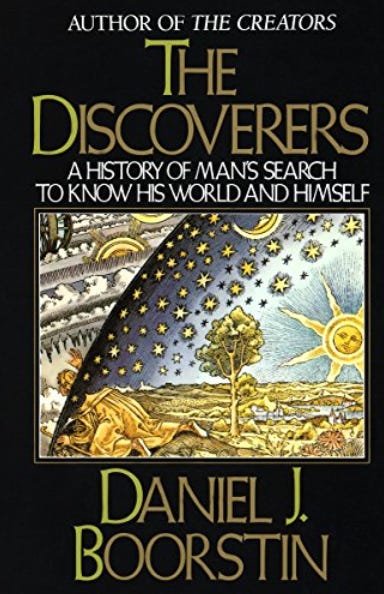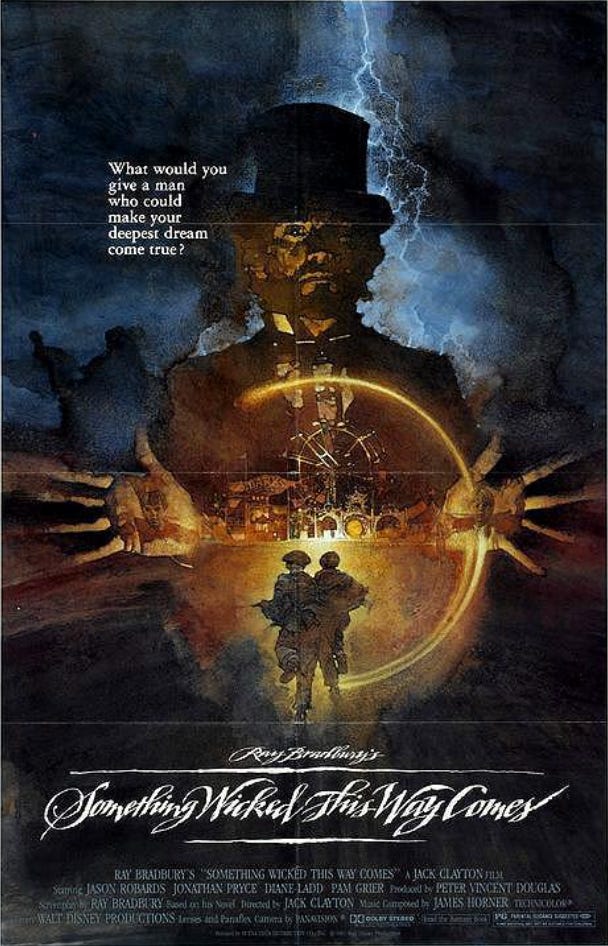Welcome aboard The Bus!
The Stop
Continuing the ‘Turning 40 in ‘23’ mini-series begun in Issue 4.2 (Albums), today’s Stop is a brief look at five books released in 1983. Typical for any year, there are a number of standouts - Isaac Asimov’s Robots of Dawn, Piers Anthony’s On a Pale Horse, Joe McGinness’s Fatal Vision and Diane Fossey’s Gorillas in the Mist to name only four - but the following are five that struck a chord with me. Not necessarily upon their release, but certainly soon afterwards.1
The Discoverers is Daniel Boorstin’s first in what, along with The Creators and The Seekers, would become known as the Knowledge Trilogy.2 Like all of these books, this one concerns the procession of history through the advancement of individuals’ lives, beliefs and accomplishments. It’s filled with information, and one I return to when looking for some inspiration. This isn’t to say the book is without its faults - it’s highly Western-centric and he is overly conservative in many of his views - but as a collection of information it’s invaluable, and one I often recommend.
The Name of the Rose is Umberto Eco’s debut and most famous novel, though it’s estimated that far more people purchased it than actually read it. It is the story of Franciscan friar William of Baskerville and his Benedictine novice Adso of Melk who, in 1327, arrive at a Northern Italian Benedictine monastery to attend a theological disputation.3 Soon after their arrival a series of gruesome murders occurs and William resolves to discover the reason behind them. A complicated, labyrinthine novel filled with arcane references and untranslated Latin, it is not an easy read - but it is worth the effort.4
The Woman in Black by Susan Hill is a gothic ghost story told from the perspective of lawyer Arthur Kipps who, hoping to rid himself of the memories from an event that haunts him from early in his career, decides to write the account. A genuinely creepy haunted house, the wet and dreary northern English countryside, cemeteries, funerals, dead children and screams and sounds that always appear at the wrong time all combine to create a very scary book - and worth a read.5
Pet Sematary is one of Stephen King’s most frightening novels, and the only one of his that really scared me when reading it.6 From the opening scenes where Louis Creed moves his young family into a house by a road where logging trucks race dangerously down the hill, to his discovery of the local children’s pet cemetery and the ancient tribal burial ground that rests just beyond, this is a tensely atmospheric, deeply unsettling and - at times - terrifying novel that is not for the fainthearted. But it’s also a great story - and one of my favourite King novels.
The Queen’s Gambit by Walter Tevis is a coming-of-age novel about a unique chess prodigy, Beth Harmon. Orphaned at the age of eight and sent to a bizarre children’s home, Beth learns the game from the caretaker and quickly discovers her remarkable genius for the game. Over the years she rises through the world of chess to become the US Champion, which catapults her onto the international stage. A novel about adoption, feminism, chess, drug addiction and alcoholism, it is also the source for the Netflix adaptation.7
The Detour
Today’s Detour is to ‘Our Frasier Remake’, a film (24:48) created by 130 animators who collaborated to reconstruct ‘My Coffee with Niles’ (1994), an episode from the television series Frasier. The film is composed of 185 different takes, each a few seconds long in the contributing animator’s distinctive style. Now, I am not a Frasier fan - I don’t not like it, but I never really watched it8 - but I appreciated this film: the animations are amazing, and even though I skipped ahead after a few minutes, the samples I saw continued to be so. Give it a try - and if you’re a Frasier fan, let me know what you think about it.
The Recommendation
Today’s Recommendation is Something Wicked This Way Comes (1983). Directed by Jack Clayton and produced by Walt Disney Productions, this adaptation of Ray Bradbury’s eponymous novel is a dark fantasy that received mixed reviews on its release. Starring Jason Robards, Diane Ladd, Jonathan Pryce and Pam Grier, it is the story of fourteen-year-old best friends Will Halloway and Jim Nightshade who encounter very dark forces when a mysterious carnival - run by the ominous Mr Dark - arrives in their small Illinois town. Exploring themes such as the power of temptation and the relation of good to evil, it is a classic coming-of-age story told in a menacing atmosphere enhanced by some (at the time) rather advanced special effects.9
Something Wicked This Way Comes (1983) Trailer
The Sounds
Today’s playlist is a selection of five great tracks released in 1983: ‘Add It Up’ (Violent Femmes, Violent Femmes), ‘Radio Free Europe’ (R.E.M., Murmur), ‘Saved By Zero’ (The Fixx, Reach the Beach), ‘Nothing Bad Ever Happens (To Me)’ (Oingo Boingo, Good for Your Soul) and ‘Everyday I Write the Book’ (Elvis Costello, Punch the Clock). Enjoy!
The Thought
Today’s Thought is from Ray Bradbury - and unfortunately very relevant:
‘You don't have to burn books to destroy a culture. Just get people to stop reading them.’
If you have a thought on this Thought - or any part of today’s issue - please leave a comment below:
And that’s the end of this Stop - I hope you enjoyed the diversion!
Thanks to everyone who subscribes - your interest and support is truly appreciated. If you like The Bus, please SHARE it with a friend or two.
If you haven’t climbed aboard The Bus, please do!
If you like The Bus, why not check out other newsletters?
The Sample sends out articles from blogs and newsletters across the web that match your interests. If you like one, you can subscribe with one click.
Until the next Stop …
After all, I only turned 14 in September that year. But I was a regular visitor to both the library and bookshops and these would have caught my eye - and I’d read them all by the end of the decade. For sheer storytelling, the King book is my favourite of the selection (much better than his Christine, also released in 1983), but the Eco book is the one the young academic me really got into - there’s nothing like it. Sources for today’s Stop include a lot of personal knowledge, but also various titular Wikipedia pages for basic information.
Boorstin was an American historian who taught predominately at the University of Chicago before being appointed Librarian of Congress. So, he knew his stuff - and if he didn’t, I don’t think he would have had a problem finding a book.
In the Middle Ages, these were strictly formalised debates designed to uncover and establish truths in theology and the sciences.
More about Eco (1932-2016) - an Italian academic, philosopher author and professor of semiotics at the University of Bologna - can be found here: Umberto Eco (Britannica).
It was also adapted into a play by the same name - a play that began as low budget Christmas play for a local theatre group in Scarborough, England and is now the second-longest running play in London’s West End. Only Agatha Christie’s The Mousetrap has run longer. Interesting that there’s not a catchy song in either of them.
I can still remember reading a particular scene in bed one night and just willing Louis not to do what he was about to do. Which, of course, the idiot did anyway. King himself has said that of all the novels he’s written, Pet Sematary is the one that ‘genuinely scared him the most.’
Which is really good, but … the novel is better.
Actually, most of what I know about Frasier comes from it being a morning television staple that pops up on the rare occasion when I’ve been home unwell from work and sleeping on the sofa because the bed is too far away.
I don’t think I’ve seen this since its release, but a couple of scenes stick in my mind. Though, to be fair that’s probably because I also read the novel at the same time - and it’s better. So check this story out, but if you can only do one, I’d suggest reading the book over watching the film.












Very apt as per usual, Bryan. I definitely do not have a compendia of pulp or popular fiction in my head as to their copyright dates - I have enough trouble trying to recall my own! - but 1983 was my coming of age year, for better or worse, and the only pop culture event that mattered that year was the release of the film 'The Day After'. Real horror, unlike the stories you mention here. And, like your quote from Bradbury, still very much relevant 40 years later.
Yes, our school system held a specific day of 'debriefing' which was unsettling and the more so, unconvincing. At 17, my peers and I were rather convinced that adults had no idea what they were doing or were, more simply, evil-doers. And I suppose the resurgence of neo-fascism in Western countries has given the lie to the sense that we survived something in the 1980s - neo-conservatism - and thus could finally imagine a human future. Still in grave doubt to my mind and yet I ask youth, 'where are you?', for when I was still a professor the young people at least on campus seemed blithely unaware of all of the present danger to the world.